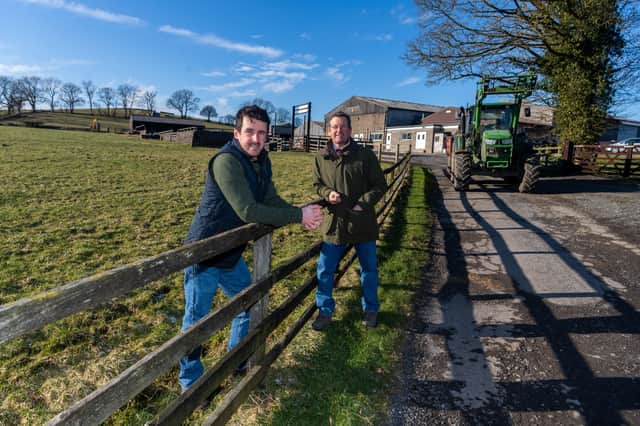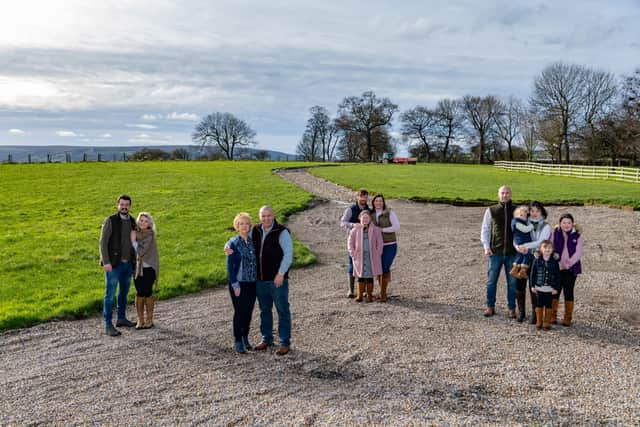Foot and Mouth: 20 years on, the horror has never gone away


Exactly three months had passed since the first case of foot and mouth was reported, and there was every sign that the symptoms he had spotted on his 600 acres at Coniston Cold, near Skipton, would be nothing but a false alarm.
“We never dreamt it would get down this neck of the woods,” he said.
Advertisement
Hide AdAdvertisement
Hide AdBut as he and the Ministry vet met halfway half way down the mile-long lane that connected his farm to the main road, the mood changed.


“I’ve not normally got a good memory but I can remember everything,” he said.
They struck up a rapport over a shared love of horses. The vet said he was sure that whatever had been spotted at Pot Haw Farm would prove not to be foot and mouth. But he was wrong. Within two days, Mr Coates’ beef and dairy herds and his 500 sheep were gone.
“My father, Joe, took it hardest,” he said. “It was what he had worked for all his life. As a tenant farmer, your livestock is all you have, and it was wiped out in 48 hours.”
Advertisement
Hide AdAdvertisement
Hide AdHis three children, the youngest just nine, also saw the cull. “My wife has always said it made them stronger,” he said.
I wouldn’t wish what happened 20 years ago on anyone. Yet as dreadful as it was, it was probably harder still for the people on neighbouring farms who weren’t culled but faced restrictions on what they could move.”
It is a story of sometimes forgotten victims that Howard Petch remembers well. In 2001 he was Yorkshire chairman and a national trustee of the Farm Crisis Network, which had been set up not long before to address the financial emergency many farmers were facing as prices plummeted.
“We didn’t know that there was a bigger crisis just around the corner,” he said.
Advertisement
Hide AdAdvertisement
Hide AdHe and the other volunteers took some 1,500 calls from farmers affected by foot and mouth in Yorkshire alone.
“Visiting farms in most cases was out of the question, so the phone was all you had.
“One of our jobs was supporting farmers who had foot and mouth on their farms, and for them it was often a case of providing emotional support because they at least knew they would be compensated financially,” Mr Petch said.
“But there were large numbers of contiguous farms that couldn’t move their livestock and couldn’t sell other than direct to an abattoir. That created a huge cash flow crisis for them because they weren’t going to be compensated in any way.”
Advertisement
Hide AdAdvertisement
Hide AdAs the pressure mounted, the Addington Fund, administered from the National Agriculture Centre in Warwickshire, was handling some 400 applications for aid each day, and the aid fund it launched boasted some notable donors. The Prince of Wales was said to be among them.
“Just under £1m went to farms in Yorkshire,” Mr Petch said. “I remember, one farmer told us he hadn’t been able to sell any of his cattle and his bank wasn’t prepared to allow him any more credit so he had no feed for his sheep that were starting to lamb. Within three days we had a load of feed on that farm.
“But it wasn’t an isolated case. It went on throughout the six months.”
At the same time, financial hardship masked an often deeper psychological impact.
Advertisement
Hide AdAdvertisement
Hide Ad“A very significant number of calls were just trying to provide moral and emotional support to people who were going through very tough times,” Mr Petch said. “I can remember a call to one family while people from Defra were shooting the stock as I spoke. It was horrendous – a bleak, bleak time.”
For today’s younger farming generation, the images are burned into their childhood memories.
Georgina Fort, chairwoman of the Yorkshire Federation of Young Farmers’ Clubs, was 12 at the time of the outbreak, and her family’s farm saw 188 cattle and 50 sheep slaughtered.
“While we were not directly affected by an outbreak, we had to have our livestock slaughtered to ensure that it didn’t spread,” said Ms Fort, who now runs the 300-acre farm in Silsden with her father, Edward, and sister, Rebecca Stapleton.
Advertisement
Hide AdAdvertisement
Hide Ad“A neighbouring farm did have foot and mouth, and because we had a lot more near us, the decision was taken to slaughter the livestock.
“I still remember how eerie it was going into the milking shed on the final day before the slaughter, knowing this would be the last time we were with the cattle.”
The slaughter became too much for many, added Ms Fort, who is now 32 and is expecting her second child in the next four weeks.
“It was such a difficult time for everyone, and in many ways it was worse than what is happening at the moment.
Advertisement
Hide AdAdvertisement
Hide Ad“We were in total lockdown and couldn’t leave the farm, as the Army were at our gates. We had to have food dropped off, and then go down to pick it up.
“We had a constant reminder of what had happened with the carcasses of the livestock still out in the fields for several days before they were taken away.
“It was there in front of you all the time, and I know some neighbours simply had to keep their curtains closed during the day so they didn’t have a constant reminder.”
John Morley was among many who had to watch his animals burn.
Advertisement
Hide AdAdvertisement
Hide Ad“We had 280 head of dairy cattle, “ he said. “They slaughtered until nearly midnight, then they came to the farmhouse door at nearly midnight to say they’d be back at 5.30am. I begged them to carry on through the night, just to get it over with.
“When they left, I went outside and what wasn’t dead I started milking. I don’t even know why. It was horrific – but I thought they would need it.”
He said he found the best way forward was to work harder than ever. But he hadn’t factored in the stress.
“I purchased another herd of cows from a friend – a third of what he owned – in November that year. But I found I couldn’t manage it. It was as if I’d been broken. I ended up having to sell them.
Advertisement
Hide AdAdvertisement
Hide Ad“You have to be really smart to realise that you aren’t well. It’s a bit of a gift knowing that, because you can become a nuisance to those around you.”
It was the “sheer carnage of multiple slaughter and the sheds full of young calves that I had to drag out” that got to him most, he said. “These images and memories just seem to stay with me and haunt me.”
He built his way out of the darkness, creating within Cross Butts Farm near Whitby a farmhouse bed and breakfast operation, a courtyard restaurant and a wedding venue from scratch.
“I knew I had to do something,” he said. “It’s every farmer’s dream to keep the family together.”
Advertisement
Hide AdAdvertisement
Hide AdLast year, he sold the restaurant and hotel but kept the farm, and is now turning the 297,000 sq ft Sneaton Castle nearby into a luxury hotel and wedding venue.
“My dad and I had been in awe of it all our lives,” Mr Morley said. “We’ve got 100 wedding bookings when the virus goes away.”
He is also taking steps back into livestock farming.
“I’m going to buy some stock. I’m going to give it a go,” he said. “But not dairy.”
Back at Coniston Cold, David Coates also used the new start the cull had given him to give rein to his equestrian interests. Pat Haw Farm is now one of the country’s leading off-road riding centres, with flagged circuits and trail days set against a spectacular Dales backdrop. There is also a thriving haylage and horse bedding business, and on the grassland graze 250 beef cattle and around 500 sheep. The dairy herd, however, has not returned.
Advertisement
Hide AdAdvertisement
Hide Ad“No matter what goes on in the world, the land is still there,” he said. “After foot and mouth it was wanting to be used. And we had a blank canvas and the chance to do what we wanted to do. In a farmer’s life that never normally happens until you finally sell up at the end of your career.”
Support The Yorkshire Post and become a subscriber today. Your subscription will help us to continue to bring quality news to the people of Yorkshire. In return, you’ll see fewer ads on site, get free access to our app and receive exclusive members-only offers. Click here to subscribe.
Comment Guidelines
National World encourages reader discussion on our stories. User feedback, insights and back-and-forth exchanges add a rich layer of context to reporting. Please review our Community Guidelines before commenting.